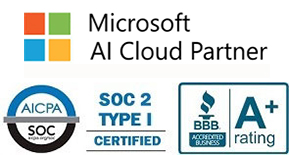IT Consulting | IT Support | Managed Services | New Jersey Computer Support Services

Cybersecurity threats are escalating across the country, but New Jersey businesses face a distinct set of challenges that amplify their risk. From sophisticated phishing campaigns to targeted ransomware attacks, these hidden vulnerabilities can slow down or stop operations, compromise sensitive data, and erode trust between customers and partners.
Today we'll explore why NJ businesses are especially popular targets, take a closer look at some of the hidden threats they face, and go over how you can keep your NJ company in the clear with personalized SMB cybersecurity.
Why NJ Businesses Are at a Higher Risk of Cyber Attacks
In a 2024 study, New Jersey was found to be the state with the highest risk of cyber attacks and the highest related financial losses. Why?
A lot of the risk can be attributed to the state's proximity to NYC and its similar busy infrastructure. With the high density of SMBs and high employee density within each business, hackers have a wide selection of endpoints to hack and team members to target with social engineering tactics.
In addition, New Jersey’s diverse mix of highvalue industries, such as finance, manufacturing, and healthcare, makes it especially attractive to cybercriminals seeking significant financial rewards.
Frequently Forgotten Cyber Risks to Keep in Mind
One of the most important things NJ businesses can do to beat the odds and protect their organization from these attacks is to understand and address these commonly overlooked threats to SMB cybersecurity:
-
Remote and Hybrid Work Weaknesses: Longdistance devices, insecure network connections, and cloud complications can make remote environments more vulnerable.
-
Outdated or Forgotten Devices: Devices that are no longer in regular use but still connected to the network can become weak points when they are unmonitored, giving attackers a clear entryway to exploit.
-
Incomplete Backup and Recovery Plans: Insufficient or untested data backups and recovery strategies can result in significant downtime or permanent data loss during a cyberattack or system failure.
-
Supply Chain Vulnerabilities: Thirdparty vendors or suppliers with poor SMB cybersecurity practices can introduce risks to your organization, even if your security is tight. Supply chain vulnerabilities create opportunities for attackers to infiltrate your business through indirect channels.
-
Lack of Employee Training: Without proper training, employees may inadvertently fall victim to phishing or other attacks, compromising sensitive data and systems.
-
Compliance Gap: Failure to meet cybersecurity guidelines for regulated industries can lead to serious data breaches, along with legal penalties and loss of customer trust.
How to Keep Your NJ Business Secure
Now that you're familiar with the kinds of risks your business may unknowingly face, let's go over SMB cybersecurity measures that can combat them.
1. Conduct a Full Cybersecurity Assessment
A comprehensive cybersecurity assessment uncovers vulnerabilities that could jeopardize your business, such as outdated devices, unsafe configurations, or risky practices. With a clear understanding of your security status, you can prioritize improvements to strengthen your defenses.
2. Implement MultiLayered Security
Protecting your business requires a holistic approach that integrates multiple layers of SMB cybersecurity. Deploy firewalls, endpoint protection, DNS filtering, and multifactor authentication (MFA) to mitigate threats at every level.
Also consider using Security Information and Event Management (SIEM) tools to help you gain complete visibility into your network, allowing you to detect and respond to threats in realtime.
3. Strengthen Employee Awareness and Training
Employees are the first line of defense in SMB cybersecurity, so make sure yours knows how to stay safe. Regularly conduct phishing simulations to test their awareness and provide cybersecurity training programs tailored to your systems. Establish clear policies for device usage and data access to minimize accidental breaches and reinforce best practices.
4. Audit Your Backups and Recovery Plan
Backup and recovery plans are critical for protecting your business by minimizing the impact of threats that bypass your defenses. To stay prepared, automate your data backups to ensure consistency, use a combination of onpremises and offsite storage for sensitive information, and regularly test your backups to confirm data can be restored when needed.
Beyond data backups, defining recovery time objectives (RTOs) can help minimize downtime during an incident and give you a guide for refining the other aspects of your recovery plan.
5. Work With a Local Cybersecurity Partner
A local managed service provider (MSP) can offer indepth knowledge of cyber threats, technology trends, and compliance requirements for the NJ area. This expertise means tailored SMB cybersecurity solutions, and their local presence means faster response times and inperson, onsite support when needed.
ICS: NJ Cybersecurity Experts You Can Trust
When it comes to SMB cybersecurity, you need someone who understands your business, including your operations, your risks, and your area.
At ICS, we work hard to provide tailored services that meet your specific needs and protect you from the unique attacks that target both your industry and the NJ area. With over 23 years of experience in New Jersey and a strong commitment to your success, we're more than ready to tackle your cybersecurity. Schedule your risk assessment to get started.
About Us:
- 150+ 5Star Google Rated IT Firm
- Microsoft Certified Cloud AI Partner
- SOC II Certified Managed Service Provider
- Better Business Bureau A+ Rated






